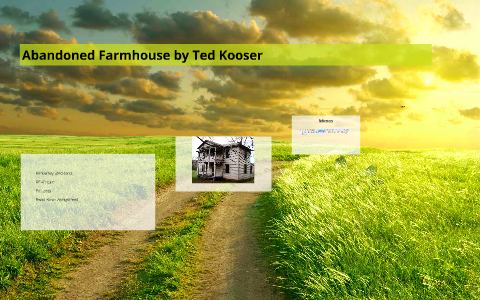Walking through the countryside, one may come across an abandoned farmhouse that stands as a silent witness to days gone by. The peeling paint, broken windows, and overgrown weeds paint a picture of neglect and abandonment. Yet, there is a haunting beauty to these forgotten structures that captivate the imagination.
Renowned poet Ted Kooser captures this sentiment in his poem “Abandoned Farmhouse,” where he delves into the lives of the former occupants and the memories left behind in the dilapidated home. The poem evokes a sense of nostalgia and melancholy, inviting readers to ponder the passage of time and the fleeting nature of human existence.
Abandoned Farmhouse by Ted Kooser Worksheet
In the poem, Kooser describes the farmhouse as a place frozen in time, where the remnants of a once vibrant life now lie in disarray. He paints a vivid picture of the wooden floors creaking underfoot, the dusty curtains billowing in the wind, and the empty rooms echoing with the ghosts of the past. Through his descriptive language, Kooser invites readers to step into the abandoned farmhouse and experience the quiet sadness that permeates the air.
As the poem unfolds, Kooser reveals glimpses of the former occupants through scattered belongings and forgotten mementos. A calendar on the wall marks the passage of days, a dusty bookshelf holds worn volumes of poetry, and a child’s toy lies abandoned in a corner. These details offer a glimpse into the lives that once filled the farmhouse with warmth and laughter, now reduced to mere relics of a bygone era.
Through his exploration of the abandoned farmhouse, Kooser reminds us of the transient nature of life and the inevitability of decay. The poem serves as a poignant reminder of the impermanence of all things, urging readers to cherish the present moment and the connections we forge with others. In the face of abandonment and neglect, Kooser finds beauty in the quiet dignity of the farmhouse, a testament to the resilience of the human spirit.
As we reflect on Kooser’s haunting portrayal of an abandoned farmhouse, we are reminded of the power of poetry to capture the essence of the human experience. Through his evocative language and vivid imagery, Kooser invites us to contemplate the fleeting nature of life and the enduring legacy of those who came before us. The abandoned farmhouse stands as a poignant symbol of the passage of time, a silent memorial to the lives that once thrived within its walls.
In conclusion, “Abandoned Farmhouse” by Ted Kooser serves as a hauntingly beautiful ode to the forgotten remnants of the past. Through his poetic exploration of decay and nostalgia, Kooser invites readers to ponder the impermanence of life and the enduring legacy of those who came before us. The abandoned farmhouse becomes a metaphor for the human experience, a poignant reminder of the transient nature of existence and the enduring beauty found in moments of quiet reflection.
